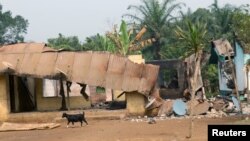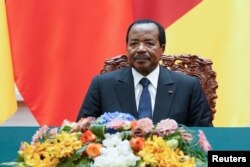Cameroon has set October 7 as the date for its presidential election. However, it remains unclear whether the vote can take place in the country's two English-speaking regions, where separatists are fighting for an independent state.
Abdoul-Karimou, deputy manager of Cameroon's election management body, ELECAM, said ELECAM has yet to receive documents from any presidential candidates. But he expects that to change.
He said according to Cameroon's electoral code, people who want to run for president still have up to July 19 to send their documents to the elections management body for examination.
Already, a dozen people including Joshua Osih of the main opposition Social Democratic Front, Akere Muna, a lawyer and former vice president of Transparency International, Maurice Kamto, head of the Movement for the Rebirth of Cameroon, and journalist Cabral Libi have declared their intentions to run.
Incumbent President Paul Biya, who has been in office more than 35 years, has not said whether he would run. But there have been calls from his party, traditional rulers, and even some opposition political parties for him to be their candidate.
Traditional ruler and lawmaker Chaffa Isaac said they are asking Biya to run in the hope that his reelection could bring peace to the embattled northwest region and complete development projects he had initiated for the whole country.
"We are calling on president Paul Biya to take all appropriate measures to create a conducive atmosphere, one for peace to reign in Cameroon, two, for there to be a successful election where he is candidate," he said.
But the Social Democratic Front's Joshua Osih said he does not think the elections can be conducted successfully in the northwest and southwest regions, where the military is battling armed groups fighting for the creation of an English-speaking state.
Twenty percent of Cameroon's 23 million people are English-speakers in a bilingual country where French is the predominant language.
The conflict has killed more than 250 soldiers, armed fighters and civilians. It has also left over 160,000 people internally displaced and and forced tens of thousands across the border in Nigeria.
"Elections are not possible in the present circumstances in the northwest and the southwest," said Osih.
Last week, lawmakers in the national assembly passed a law extending their mandate for 12 months. They said the country cannot handle having presidential and parliamentary elections in the same year.
Some lawmakers said they voted for the bill because the crisis in the English-speaking regions will make it impossible for the elections to take place.
Last March, senatorial elections did not take place in the English-speaking Manyu and Lebialem administrative units where some municipal councilors were arrested and locked up by armed groups.
Armed separatists have vowed to block any elections in the English-speaking regions. The government says it will ensure the security and safety of voters.





